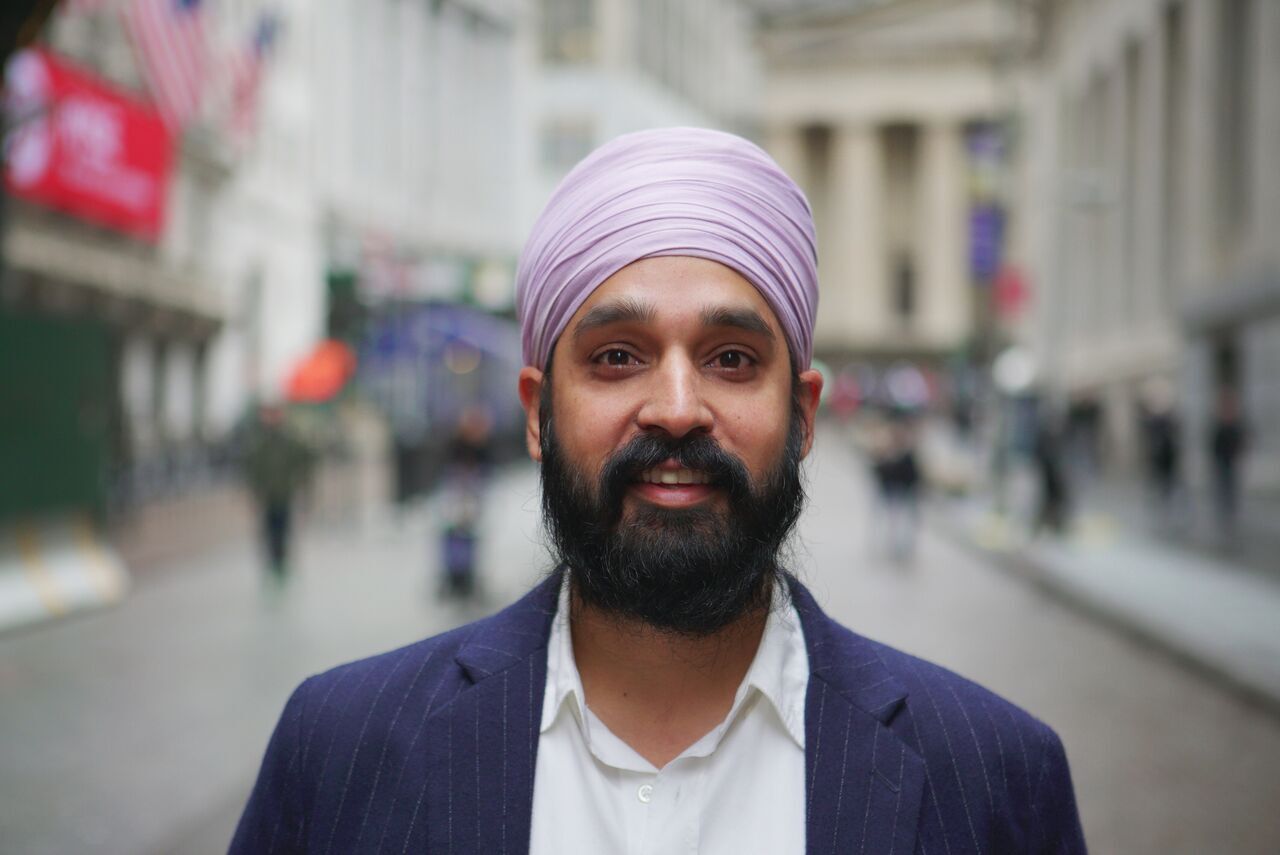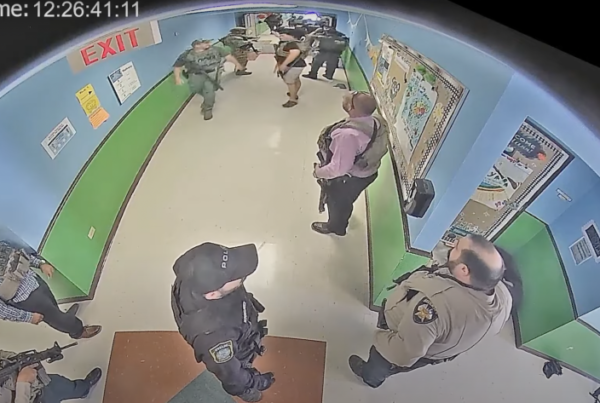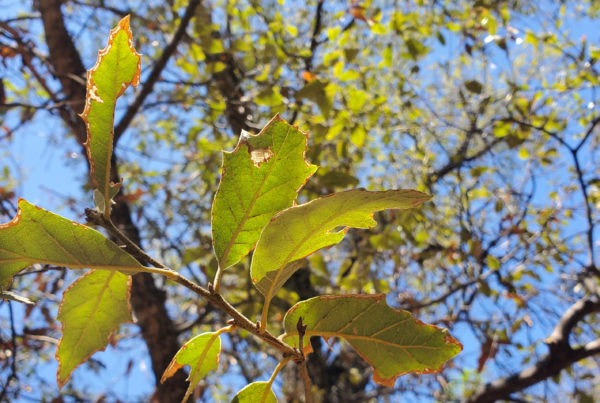Growing up in post-9/11 Texas, Simran Jeet Singh regularly faced racism.
Singh is an author and the executive Director for the Aspen Institute’s Religion & Society Program. He’s from San Antonio, and as a follower of the Sikh faith, he wears a turban. His parents are from Punjab, a region of northern India and Pakistan.
Singh could have grown angry over the discrimination he and other members of his community experienced. instead, he leaned on the pillars of his faith, and met hate with love. Singh spoke to Texas Standard about his new book: “The Light We Give: How Sikh Wisdom Can Transform Your Life.” Listen to the interview above or read the transcript below.
This transcript has been edited for clarity:
Texas Standard: First, tell us a little bit more about growing up here in Texas when you did. What did it feel like to be here as a child and a young adult?
Simran Jeet Singh: Yeah, I appreciate that question. You know, I have very, very fond memories of growing up in Texas. Actually, I was born and raised in San Antonio. I have three brothers and we’re very close in age. And, you know my poor mom having to raise four young boys anywhere. Right. It’s a challenge. We had a very positive upbringing from childhood. And I’d also say that in many ways, our lives were very unusual. We had turbans, we had brown skin. People didn’t really know what to make of us when they saw us. And sometimes our racial difference and our religious difference invited malice and hatred from other people. And so we had to learn from a really young age how to deal with that, how to deal with being different, and also how to deal with being seen as the enemy sometimes.
Well when you talk about the malice that you faced, like what? I mean, what sort of things did you encounter growing up in Texas?
Oh, you know, it was them from the small to the large. There were moments I remember in school being bullied, being pushed out of the boy’s bathroom because I have long hair. And they said I’d have to go to the girl’s bathroom. You know, my brother being called a diaper head and other kinds of names and then moments that felt bigger, being asked to sit out of soccer games because referees or opposing coaches said we couldn’t play with our turbans or my older brother had to sit out his entire freshman year of basketball because high school rules in Texas wouldn’t allow him to play with his turban. And so there were those kinds of moments which were challenging. And things really sharpened my senior year of high school when it was 2001, the school year had just started and the terrorist attacks of 9/11 happened. And, racism wasn’t new for us in terms of what we experienced, but certainly, the animus really sharpened. People really started to question who we were and what we were doing and what they saw as their country and not our country. And those attacks then became really, really violent, physical and actually quite dangerous.
I’m struck by what you said, that you felt like your upbringing in Texas was largely happy, and the incidents that you describe, I think many people would feel bitter, infuriated, frustrated by the discrimination that you and your family experienced. But this book is really dedicated to meeting hate with love. And I’m curious about why you don’t think that feeling of resentment and bitterness sank in for you?
Yeah. It’s something that I think I really learned from my parents and from the teachings to the days following 9/11 where people were coming by our house and threatening us and calling us on the phone with their death threats. I mean, it was really scary. And then we were actually learning about attacks against people who were perceived as the enemy all around the country. And it was really threatening. One of the things that my parents pointed out in that experience was, hey, the ugliness feels sharp and it feels rough. But also notice all of the goodness that’s happening around you. There are all sorts of things that were happening around us that we weren’t really paying as much attention to. You know, our friends were calling to check in on us. Our neighbors were bringing by food to make sure we were okay. I mean, people knew what was happening and they were there to meet us. And the lesson from my parents in that moment was actually, if you pay attention and if you really notice there’s so much more goodness out there in the world than there is bad. There’s so much more love than hate. There’s so much more lightness than there is dark. And so that lesson, I think, really helped me understand that if we really choose to pay attention, we can see the goodness in the world. And it doesn’t always have to feel so, so difficult and terrifying.
You ground a lot of this book in the spiritual teachings of your faith. And you mention, especially in the last section of the book, this Sikh idea called Sewa, and you mentioned that it bridges the realms of spirituality and justice. Could you say more about that and how that informed your reaction to what you faced?
Yeah, I love the question because I think this is actually one of the unique contributions that Sikh teachings has for our world today. So often when we think about doing good for others, we do it almost out of an obligation or a moral responsibility. We say we should help others because it’s the right thing to do. And, you know, I absolutely agree with that. There’s something important about ethical practice. But one thing we forget to really appreciate is how much we change when we serve others and how we can become better people. And this is what Sikh philosophy offers us, that by, for instance, I can share an example with you when the pandemic hit and I was very stressed about COVID and worrying about keeping my family safe. One of the ways that I started to get out of my self-centeredness, my deep concern for myself, and my obsession with myself was to step out and serve others. And it was through serving others that I really captured my woundedness and regained my perspective that, you know what? Life isn’t just about you. And actually, if you can serve others, that offers you a way to reduce your ego and find more long-term happiness. So that’s the teaching of Sewa in the Sikh tradition. I found it really powerful in my life.
I think a lot of people would identify with sort of the importance of empathizing. Right. Trying to see the world from someone else’s perspective, even someone who might wish you harm or hatred. How do you cultivate, though, that mindset, that empathy in your day-to-day life, which is something I would imagine you would have to do?
Yeah. Empathy is such a basic teaching in our world. It’s something that I try and teach my young daughters. It’s something that our faith traditions teach us. Right? Like love. Love your neighbor. What does it look like to really care about the people who are all around us? And one of the things I’ve learned in my life is it’s really easy to say that, and it’s really easy to even believe that. I’d like to really hold it in your heart, but what does it take to actually live that in the difficult moments in our lives when people are actually there who don’t like you and you love them anyway? What does it take to get there? And I think to me, the only thing that I found that really makes sense is, is the daily discipline, the daily practice. What are you doing every day to cultivate that love so that when the difficult moments come and the people who are out there and don’t love you, you’re able to love them anyway, right? In spite of how they see you or how they treat you. And so to me, I don’t think there is a clear-cut formula, and I don’t think there. Shortcuts or, you know, superstitions or magical powers that any of us can access. I think it’s really simple, actually. My faith teaches me that to get to a daily experience of love that only comes through a daily practice of love, and that’s what we can all be doing each day.














